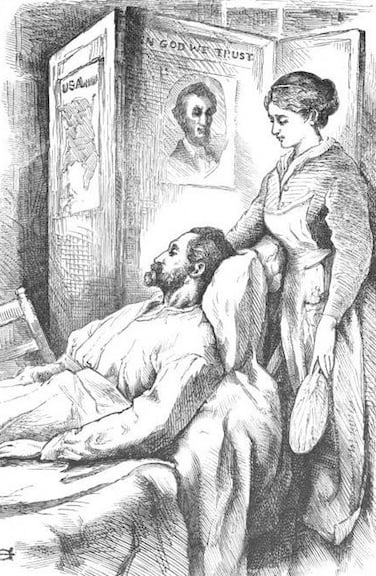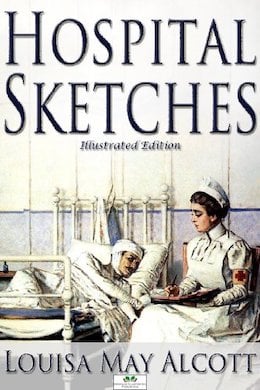Louisa May Alcott’s Experience as a Civil War Nurse
By Taylor Jasmine | On September 5, 2017 | Updated December 6, 2022 | Comments (0)

“I WANT something to do,” Louisa May Alcott wrote of her desire to contribute to the Union Army’s effort in the Civil War.
If women had been allowed to serve as soldiers, Louisa would have surely taken up arms. But as it was, the only direct way women could serve was to volunteer as nurses, and that’s just what she did. The photo at right was from around the time she served.
After the crushing defeat of Union forces in Fredericksburg, December 1862, Louisa began her duties as a nurse at the Union Hotel in Georgetown, Washington D.C. It had been hastily turned into a makeshift hospital.
As life-threatening as battleground injuries were to life and limb of soldiers, disease in the aftermath was nearly as much a threat. Not only to the soldiers themselves, but to those who cared for them.
And indeed, not even a month into her service, Louisa came down with typhoid pneumonia, complete with a horrendous cough and a high fever.
Here, telling how it all happened, is Ednah D. Cheney, Louisa’s first biographer and editor of Louisa May Alcott: Life, Letters, and Journals, originally published in 1898. Read more about Alcott’s experience as she described them in Louisa May Alcott’s Civil War Journals.
A patriot from an abolitionist family
Miss Alcott could not help feeling deeply the excitement of the hour when the war broke out. Her father had been one of the earliest Abolitionists, having joined the Antislavery Society with Garrison, and she well remembered the fugitive slave whom her mother had hidden in the oven.
Now this feeling could be united with her patriotic zeal and her strong love of active life, and it was inevitable that she should long to share personally in the dangers and excitement of the war.
Off to serve as a nurse at Union Hospital
Louisa had always been the nurse in the family, and had by nature the magnetic power which encourages and helps the feeble and suffering; therefore, since no other way of serving the cause opened to her, it was most like her to take her own life in her hands and join the corps of devoted nurses.
She was accepted, and went to Washington. Her journal gives an account of her situation in the Union Hospital at Georgetown.
It was a small hospital, much inferior in its appointments to those which were afterward arranged. Although Louisa had never been very ill up to that time, and thought herself exceptionally strong, yet she had not the rugged constitution fit to bear the labors and exposures of such a position; and the healthful habits of outdoor life and simple food to which she had always been accustomed made the conditions of the crowded, ill-ventilated hospital peculiarly perilous to her.
She says, “I was never ill before this time, and never well afterward.”
But with all its hardships, Miss Alcott found in the hospital the varied and intense human life she had longed to know. Her great heart went out to all the men, black or white, the Virginia blacksmith and the rough Michigander.
She even tried to befriend the one solitary rebel who had got left behind, and who was taken into the hospital to the disgust of some of the men; but he was impervious to all kindness, and she could find nothing in him for sympathy or romance to fasten upon.
Falling seriously ill and returning to Concord
Miss Alcott remained in the hospital only about six weeks. Yet this short period had a very strong influence, both for good and evil, on her future life.
The severe attack of fever which drove her from her post left her with shattered nerves and weakened constitution, and she never again knew the fulness of life and health which she had before.
The chamber in her quiet home at Concord was evermore haunted by the fearful visions of delirium, and she could not regain there the peace she needed for work.
But the experience of life, the observation of men under the excitement of war, the way in which they met the great conqueror Death, the revelations of heroism and love, and sometimes of bitterness and hate, brought her a deeper insight into human life than she ever had before, and gave to her writings greater reality.
. . . . . . . . . . .
. . . . . . . . . . .
Recording her experiences
Louisa constantly wrote to the family of her experiences, and these letters were so interesting that she was persuaded to publish them in the “Commonwealth” newspaper.
They attracted great attention, and first made her widely and favorably known to a higher public than that which had read her stories.
These letters were published by James Redpath in book form, and Miss Alcott received $200 for the book,–a welcome sum to her at that time.
The sketches are almost a literal reproduction of her letters to her family; but as they have been so extensively read, and are accessible to every one, I shall give in preference to them extracts from her journal kept at the hospital.
Other stories growing out of her experience in the hospital, or more remotely connected with it, have been published in the same volume in later editions.
“My Contraband”
“My Contraband” is one of the most dramatic and powerful stories she ever wrote. She portrays the intensity of hatred in a noble nature – hatred justified by the provocation, and yet restrained from fatal execution by the highest suggestions of religion.
This story called forth a letter of commendation and frank criticism from Col. T. W. Higginson, which was very encouraging to the young writer.
The beautiful lines on Thoreau’s flute, the most perfect of her poems, excepting the exquisite tribute to her mother, were first composed in the watches of the night in the hospital, and afterwards recalled during the tedious days of convalescence at Concord. This poem was printed in the “Atlantic,” and brought her a welcome ten-dollar bill.
Hospital Sketches
“Hospital Sketches” was hastily written, and with little regard to literary execution, but they are fresh and original, and, still more, they are true, and they appeared at just the time the public wanted them.
Every heart was longing to hear not only from field and camp, but from the hospitals, where sons and brothers were tenderly cared for.
The generous, hopeful spirit with which Miss Alcott entered into the work was recognized as that which animated the brave corps of women who answered so promptly to their country’s call, and every loyal and loving heart vibrated in unison with the strings she touched so skillfully.
. . . . . . . . . .

Illustration from a later edition of Hospital Sketches by Louisa May Alcott

Leave a Reply